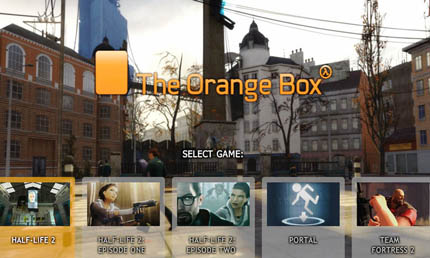
Valve's Virtuosity
Date: Wednesday, October 17 @ 09:44:03 UTC
Topic: Off Topic
We travel to Seattle to find out how Valve Software has repeatedly played with gaming’s rules, and discuss the company’s crowning achievement: The Orange Box.
Valve may well have outdone itself. Inevitably, such a claim sounds a touch hyperbolic given the history of the company; over the last ten years, the people of Valve Software have created one of the most successful multiplayer games of all time in Counter-Strike, redefined excellence in the singleplayer shooter genre – first with the influential Half-Life, then again with its stunning sequel – and modernized the way games are delivered using Steam a digital distribution platform and community service.
Now, with the release of The Orange Box, Valve’s ambitions seem to be ascending in an exponential curve. Putting aside the exceptional quality of the games therein, the manner of its release epitomizes Valve’s tendency towards unique, and often brilliant, experimentation: The Orange Box is a compilation of five parts, bringing together the two previously released installments of Half-Life 2 and three entirely new prospects – all for the price of a single new release.
“We had these three projects under development – Half-Life 2: Episode Two, Team Fortress 2 and Portal – and they were all sort of converging,” explains Gabe Newell, Valve’s founder and leader, recalling the conversation which brought about their amalgamation into a single product.
“We were looking at this trying to figure out what to do. In the end we determined to stop thinking about it in terms of schedules and certification processes and start thinking from the point of view of a customer. What would they think about something like The Orange Box? I felt it’d be really exciting for them, and because that was an easy decision for a gamer, it became an easy decision for us to do that. If finding that compelling concept for your customers is the filter on your decisions, you’re almost never going to go wrong.”
 This kind of agility and flexibility is a rare freedom, and for it to be directed with such audaciousness is rarer still. If this was not evidence in itself, it takes only a few hours at Valve’s Seattle offices to realize that the company is exceptionally idiosyncratic, even when placed alongside the frequently unorthodox working environments of other videogame virtuosos. Ask nearly anyone what their job title is, and they will take on a pensive expression before suggesting that they might be a designer.
This kind of agility and flexibility is a rare freedom, and for it to be directed with such audaciousness is rarer still. If this was not evidence in itself, it takes only a few hours at Valve’s Seattle offices to realize that the company is exceptionally idiosyncratic, even when placed alongside the frequently unorthodox working environments of other videogame virtuosos. Ask nearly anyone what their job title is, and they will take on a pensive expression before suggesting that they might be a designer.
“We don’t really do job titles,” says Jeep Barnett, one of Valve’s more recent acquisitions, plucked from university along with the rest of the team behind Portal. Later, Episode Two’s Gautum Babbar dismisses the idea that there is any one person behind the direction of the series. It’s a recurring theme; responsibilities are shared and positions are rarely set in stone, employees expected to straddle roles and make themselves useful in any way they can.
“I think my personal view is that we’re in the business of inventing things that haven’t existed before,” says Newell. “A lot of times, solutions fall between the cracks of existing role definitions. Is this an art problem? Is this a tech problem? Is this a design problem? Often the answer is all of the above, and you need people who are really comfortable spanning multiple disciplines.”
It’s a need Valve has clearly taken pains to fulfill, and it’s somewhat intimidating to discover that nearly everyone in the company seems to be a polymath. Newell picks a few examples off the top of his head: “Ken Birdwell, who wrote all the code in our animation system, also has a fine arts degree and has done a bunch of art shows – he just happens to write code really well. Our HR person is a professional actor who can do voices in our games. Chet Faliszek – he’s supposedly a writer, but he functions just as well in a role that is traditionally a producer’s role. But he just did it on his own – no one said he was getting promoted to a producer’s track – he just started being incredibly useful to everyone else on the Left 4 Dead team.”
News-Source: NextGen
|
|